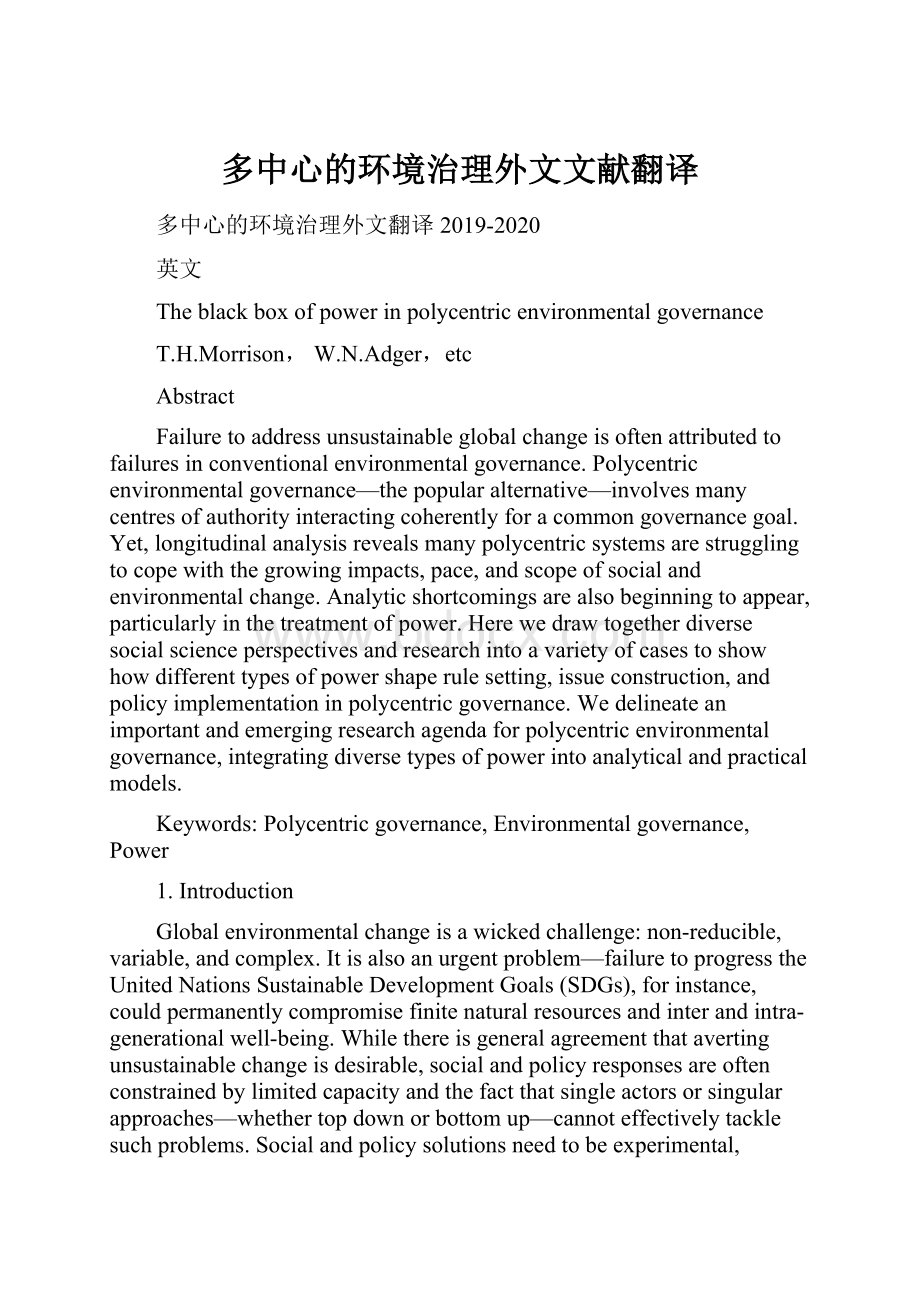多中心的环境治理外文文献翻译.docx
《多中心的环境治理外文文献翻译.docx》由会员分享,可在线阅读,更多相关《多中心的环境治理外文文献翻译.docx(16页珍藏版)》请在冰豆网上搜索。

多中心的环境治理外文文献翻译
多中心的环境治理外文翻译2019-2020
英文
Theblackboxofpowerinpolycentricenvironmentalgovernance
T.H.Morrison,W.N.Adger,etc
Abstract
Failuretoaddressunsustainableglobalchangeisoftenattributedtofailuresinconventionalenvironmentalgovernance.Polycentricenvironmentalgovernance—thepopularalternative—involvesmanycentresofauthorityinteractingcoherentlyforacommongovernancegoal.Yet,longitudinalanalysisrevealsmanypolycentricsystemsarestrugglingtocopewiththegrowingimpacts,pace,andscopeofsocialandenvironmentalchange.Analyticshortcomingsarealsobeginningtoappear,particularlyinthetreatmentofpower.Herewedrawtogetherdiversesocialscienceperspectivesandresearchintoavarietyofcasestoshowhowdifferenttypesofpowershaperulesetting,issueconstruction,andpolicyimplementationinpolycentricgovernance.Wedelineateanimportantandemergingresearchagendaforpolycentricenvironmentalgovernance,integratingdiversetypesofpowerintoanalyticalandpracticalmodels.
Keywords:
Polycentricgovernance,Environmentalgovernance,Power
1. Introduction
Globalenvironmentalchangeisawickedchallenge:
non-reducible,variable,andcomplex.Itisalsoanurgentproblem—failuretoprogresstheUnitedNationsSustainableDevelopmentGoals(SDGs),forinstance,couldpermanentlycompromisefinitenaturalresourcesandinterandintra-generationalwell-being.Whilethereisgeneralagreementthatavertingunsustainablechangeisdesirable,socialandpolicyresponsesareoftenconstrainedbylimitedcapacityandthefactthatsingleactorsorsingularapproaches—whethertopdownorbottomup—cannoteffectivelytacklesuchproblems.Socialandpolicysolutionsneedtobeexperimental,adaptive,distributed,andmulti-scale(Loorbachetal.,2017; Ostrom,2010a; PattbergandWiderberg,2016).
Environmentalgovernancestructureshavebroadenedinresponsetosuchcomplexityandinterdependency,fromtop-downcentralisedapproachestodecentralised,community-based,orpolycentricarrangements,incorporatingnotjustprinciplesofefficiencybutalsothoseofequity,legitimacy,andaccountability(LemosandAgrawal,2006).PolycentricgovernancestructuresinparticularhavebecomepopularwithanalystssinceElinorOstrom’sreflectionsin2010onthefailureoftopdownsolutions(Ostrom,2010a).
Theconceptof polycentricgovernance isbestunderstoodwhenjuxtaposedwithmonocentricgovernance(Ostrometal.,1961).Anideal-type monocentric systemisonecontrolledbyacentralpredominantauthority(e.g.acomprehensivegovernmentalauthorityorprivatemonopolyresponsibleforallgoodsandservices).Bycontrast,a polycentric systemcomprisesmultiplegoverningauthoritiesatdifferentscaleswhichdonotstandinhierarchicalrelationshiptoeachotherbutareengagedinself-organisationandmutualadjustment(Ostrom,2010a).
Polycentricsystemsareattractivetoawidevarietyofinterestsinthattheyallowformorepolicyinnovationanddiffusionacrossmultipleorganisationalunits,whetherthrough“hard”regulationor“soft”instrumentssuchaseconomicincentives,voluntaryagreements,self-regulation,andsustainabilitycertification(Jordanetal.,2013, 2015).Advocatessuggestthatthisformofgovernancecreatesnewopportunitiesformultipleactorsatmultiplelevelstotakeresponsibilityforinitiatingandimplementingsustainabilityandresiliencesolutions(CarlisleandGruby,2017; PattbergandWiderberg,2016; Steffenetal.,2018).Polycentricgovernanceisalsounderstoodtoprovidemoreopportunitiesforrepresentationofdifferentsocialactorsthanmonocentricgovernance.Assuch,itsinclusivitycanbeviewedasamorelegitimateformofgovernance.Inprovidingopportunitiesforinnovationandexperimentationacrossmultipleorganisationalunits,polycentricgovernancecanalsoenablethedevelopmentoftailor-madesolutionsthatarefitforpurpose(Lebeletal.,2006).Itadditionallyprovidesalevelofflexibilityandnimblenessthatmaynotbepossibleintraditionalhierarchies.Furthermore,polycentricgovernanceisregardedasmorerobust:
whenonepartofthesystemfailstherearemultipleotherpartsabletostepin(Ostrom,2010b).
Whilenotapanacea,polycentricismholdsmuchpromiseforsolvingthemultiplegovernancechallengesofenvironmentalchange(AligicaandTarko,2012; AnderssonandOstrom,2008).However,newresearchonpolycentricgovernanceisalsochallengingnormativeprescriptions,somewhatcontroversially(Gallemore,2017; Sovacooletal.,2017; Sunderlinetal.,2015).Inmanycases,polycentricgovernancesystemsarestrugglingtocopewiththegrowingrisksofrapidsocialandenvironmentalchange(Jordanetal.,2018).Documentedproblemsincludehightransactioncosts,inconsistencies,freeloading,unanticipatedeffects,gridlock,andultimateimplementationfailure(Morrisonetal.,2017).Anewstrandofenvironmentalpolicyscienceisalsobeginningtohighlighthowtheconceptofpolycentricityisplaguedbyinherentcontradictionsandassumptions,andthatsomebiggapsinknowledgeremain.Powerdynamicshavebeenhighlightedasoneofthesegaps(Morrisonetal.,2017),alongsideassumptionsaboutpolicyexperimentation(Huitemaetal.,2018),lackofunderstandingoffeedbacks(BerardoandLubell,2019),andlimitedevaluationofeffectiveness(SchoenefeldandJordan,2017).ThecentralfocusofthisPerspectiveisthepronouncedlackofanalysisoftheroleofpower.
InthisPerspective,wedefinepowerastheunevencapacityofdifferentactorstoinfluencethegoals,process,andoutcomesofpolycentricgovernance.Wearguethatwhileitisaxiomaticthatallgovernance(whethermonocentric,integrated,decentralised,orpolycentric)involvesunevenpowerdynamics,manystudiesofpolycentricgovernanceprovideonlypartialanalysesoftheinitialdesignortheemergentstructureofpolycentricsystems,ignoringunevenpowerdynamicsorrelegatingthemtobeingexogenoustothesystem.Intherarecaseswherepowerishighlighted,weshowthatanalysestendtofocusonthepotentialnegative effects of(higher-level)power;theyrarelyhighlighttheprocessnorthepositiveoutcomesofpowerfulsteeringor“orchestration”(Abbott,2017).Wearguethatscientistsandpolicymakerscanimprovetheirabilitytoexplainandenhancetheenvironmentaloutcomesofpolycentricsystemsbyre-conceivingpolycentricgovernancenotjustasastructuralsolutionoradiagnosticbutalsoasasetofdiverseinstitutions,agencies,andothersocialactorsinfluencedbypower-ladensocialrelationships.Distillingthepowerdynamicsinherentinpolycentricgovernancewillthusbeacriticalstepinmovingfrompolycentricgovernanceasaconcepttopolycentricgovernanceasatheoryandpracticeforaddressingglobalenvironmentalchange.Weconcludebyhighlightingfutureresearchneedswhicharedependentonapower-centredanalysis.
2. Thepowergapinpolycentricgovernanceandwhyitmatters
Allgovernanceinvolvespower:
morepowerfulactorsreceivemorefavourableoutcomesthanlesspowerfulones;equalityandfairnessarerare.However,whilemanyanalystsofpolycentricgovernancehaveoftenacknowledgedpowerdynamics,theyhavenotdirectlyaddressedhowpowerdynamicscanchallengeorreinforcepolycentricgovernancesystems(AgrawalandOstrom,2006; Mansbridge,2014).Asaresult,studiesofpolycentricenvironmentalgovernanceoftenremainsnapshotanalysesofonlytheinitialdesignortheemergentstructureofpolycentricsystems,withpost-hocanalysisofpowerdynamicsoftenrelegatedtoanexplanatorypostscriptabout“ablackboxofpolitics”or“thelackofpoliticalwill”.Forexample,showsthatwhiletherehasbeenadramaticriseofscientificinterestinpolycentricenvironmentalgovernancesinceElinorOstrom’sinfluential2010 GlobalEnvironmentalChange article,scientificinterestinthepowerdynamicsofpolycentricgovernanceisonlynowemergingasanimportantfieldinitsownright.
Thereareavarietyofreasonswhythepowergappersistsinpolycentricenvironmentalgovernance.Thecomplexityandmessinessofpolycentricsystemsmeansthatpowerdynamicsarehiddenmoreeffectivelythaninothergovernancetypes;theyaredifficulttoobserve,toughtodefine,slipperytomeasure,trickytogeneraliseabout,andchallengingtomanage(Sovaetal.,2016).Scientists,policymakers,andpractitionersworkingattheinterfacebetweentheapplicationofscienceandpolicycanalsofindpowerdynamicssensitiveanduncomfortable,andthereforemayoftendeliberatelyorinadvertentlyoverlookthem.
Oversightofpowerdynamicsalsohasitsrootsindisciplinarydivisionsandtrends.Forexample,whileimportantstrandsofpoliticalsciencehavefocusedonthestrategiesofpowerfulactorsindrivingandaddressingglobalchange(suchastheWorldTradeOrganisation,theUnitedNations,theUnitedStates,andmultinationalcorporations)(Nye,2008),theseinsightshaveoftenremainedseparatefromthepolycentricenvironmentalgovernanceliterature,whichtendstofocusonthediffusionofpoweracrossgroupsofactors(withthenotableexceptionofAbbott(Abbott,2017; AbbottandBernstein,2015)).Thebiastowardsdiffusepoweralsoreflectsthebroadergovernanceliterature,whereresearchersinthekeyfieldsofAmericanfederalismandEuropeanUnion(EU)studies(Feiock,2013; HoogheandMarks,2003; Scharpf,2006),politicalscience(CrookandManor,1998),publicpolicyandadministration(BevirandRhodes,2006),andinstitutionaleconomics(Ostrom,2010b),havespentmanyyearsexploringthediffusionofpowerawayfrompowerfulsoleactorssuchasacentralisedgovernmentalauthority.Andasablyilluminatedby Partzsch(2017